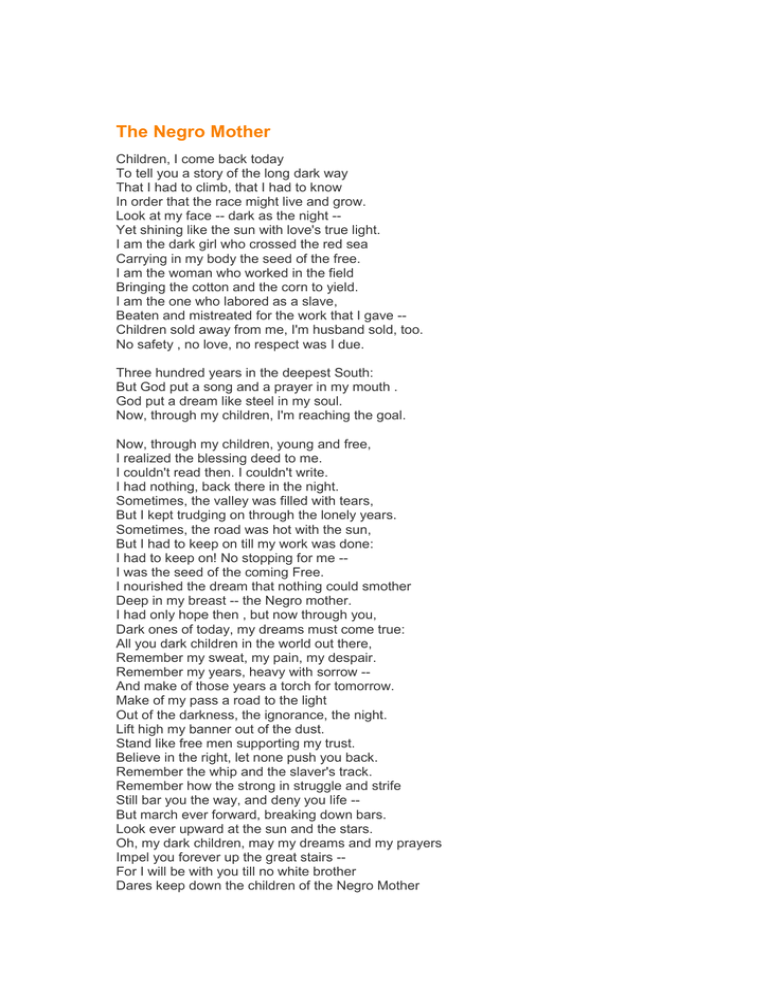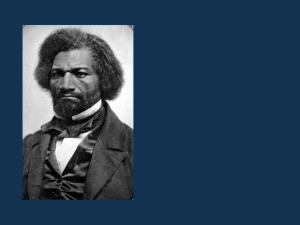The Negro Mother
advertisement

The Negro Mother Children, I come back today To tell you a story of the long dark way That I had to climb, that I had to know In order that the race might live and grow. Look at my face -- dark as the night -Yet shining like the sun with love's true light. I am the dark girl who crossed the red sea Carrying in my body the seed of the free. I am the woman who worked in the field Bringing the cotton and the corn to yield. I am the one who labored as a slave, Beaten and mistreated for the work that I gave -Children sold away from me, I'm husband sold, too. No safety , no love, no respect was I due. Three hundred years in the deepest South: But God put a song and a prayer in my mouth . God put a dream like steel in my soul. Now, through my children, I'm reaching the goal. Now, through my children, young and free, I realized the blessing deed to me. I couldn't read then. I couldn't write. I had nothing, back there in the night. Sometimes, the valley was filled with tears, But I kept trudging on through the lonely years. Sometimes, the road was hot with the sun, But I had to keep on till my work was done: I had to keep on! No stopping for me -I was the seed of the coming Free. I nourished the dream that nothing could smother Deep in my breast -- the Negro mother. I had only hope then , but now through you, Dark ones of today, my dreams must come true: All you dark children in the world out there, Remember my sweat, my pain, my despair. Remember my years, heavy with sorrow -And make of those years a torch for tomorrow. Make of my pass a road to the light Out of the darkness, the ignorance, the night. Lift high my banner out of the dust. Stand like free men supporting my trust. Believe in the right, let none push you back. Remember the whip and the slaver's track. Remember how the strong in struggle and strife Still bar you the way, and deny you life -But march ever forward, breaking down bars. Look ever upward at the sun and the stars. Oh, my dark children, may my dreams and my prayers Impel you forever up the great stairs -For I will be with you till no white brother Dares keep down the children of the Negro Mother “The Negro Mother” is the title poem in the collection of poetry that Hughes wrote to reach the masses of black people. The twenty-page book and the poem were such an instant success that Hughes told his friend Carl Van Vechten that in Birmingham, Alabama, the book “sold like reefers on 131st Street.” The voice in the poem is that of the black mothers through the ages. In the opening line, the narrator addresses her children. In the narrative that follows, “the Negro mother” depicts the capture and hardship of black slaves and speaks of the will to endure that kept them going. The voice of the Negro mother urges the children to transform the future so that they may live in dignity and freedom from white oppression. The poem, often referred to as a heritage poem, is highly lyrical, employing both a regular rhyme scheme (couplets) and meter. It was Hughes's intention, he said, that the poems be pleasant to recite and easy to remember. “The Negro Mother” and the success of the volume show how keenly in tune Hughes was with his audience Langston’s Hughes’“The Negro Mother”is a lyrical poem about a negro mother addressing to her sons about her struggles in her past life. The poemdisplaysapassionatejourneyofawomanstrivingfortherightsandequalityoftheAfrica nAmericanpeopleassheelaboratesheremotionstoshowthehardshipshehasbeenthrough.Ina dditiontoherpastexperiencethenarratorusesherstruggleasareminderforhersonaboutthestr ugglesherselfandtheirancestorshavegonethroughinordertoencouragethemtocontinuethe irfight.Inthepoem,thepoetusesofthenarrator’sdiction,oxymoronandmetaphortoportrayt hethemeofhowAfricanAmericansshouldalwaysstrivetofightfortheirrightsandequalityin society.Initiallythepoet’suseofdictioncreatesatonethaturgesAfricanAmericanstostrivef ortheirequalityinsociety.Inthebeginningofthepoem,thepoetemphasizesontheusageofthe wordssuchas“dark”(5),“night”(5),“labored”(11),“slave”(11)and“mistreated”(12)toexp resshowoppressedandsubjugatedtheBlackPeopleare,especiallyundertheracismanddiscr imination.Thedictioncontributestothehardshipandtheabusivesituationthatthenarratorm ustfacethroughoutthecourseofherstriveforfreedom.Onthecontrary,asthepoemprogresse s,thepoetusesapositivetonetocounteractthemiserabletonethatwasdepictedinthebeginnin gofthepoem.Dictionsuchas“torchfortomorrow”(36),“roadtothelight”(37)and“lookever upwardatthesunandthestars”(46)createsahopefulandrelievin tonethatcorrespondstothenegativetone,givingamessagethatevenifthefuturegenerationso fBlackPeoplehavetofacethehardshipofbeingdiscriminatedandmistreated,therewillalwa ysbehopeforthemaslongastheyfightlikethenarrator.Thenarratorclaimsherselfas“theseed forthecomingFree”(28),the“Free”(28)iscapitalizeinordertoemphasizetheimportantdrea msasthenarrator“nourished”(29)thedream“deepinmy[Negromother]breast”(30).Moreo ver,thenarratorclaimthat“God”(16)“putadreamlikesteelinmy[Negromother’s]soul,”(17 )inwhichtheword“steel”(17)isastrongandstableobject,bycomparingthe“steel”(17)tothe “dream”(17),thedreamwassettled.Furthermore,thenarrator“hadonlyhopethen,”butshew ishesthroughtheyounggeneration,sheusedastrongdictionof“must”(32)toemphasizethen eedstofulfilherdreamby“stand[ing]likefreemensupportingmy[negromother’s]trust”(40) Inaddition,oxymoronisalsousedinthepoemtoshowthecontrastbetweentheharshnessofrea litythatputsdownthenarratorandthenarrator’swillandefforttofindequality.Forexample,w henthenarrator“couldn'treadthen.couldn'twrite./[she]hadnothing,backthereinthenight”( 2122)andas“Sometimes,thevalleywasfilledwithtears”/shewouldstill“[keep]trudgingonthr oughthelonelyyears”(2324).Furthermore,thereisacontrastbetweenthedarknessoftheAfricanAmerican’streatmentandtheiroptimisticencouragementtowardstheirgoalsinachievinggr andequality.ThenarratorusedherstrugglesasareminderfortheyoungAfricanAmericanpeopleassheremindedthemofher“sweat,”(34)“pain”(34),“despair”(34)andyea rs,heavywithsorrow/andmakethoseyearatorchfortomorrow/make[s]ofmypassaroadtoth elight/Outofthedarkness,theignorance,thenight”(3638).Thecontrastisshownasshestruggleswiththevariousdramaticobstaclesinlifeandasthen egativityisputdownonher,shewouldstillkeepwalkingandmovingforwardtofightforabette rplace,bothforherandherpeople.Thecontrastbetweenthenegativeforceandthenarrator’sw illpowershowsthenarrator’sintenttoinspiretheblackpeopletonotgiveuptheirgoalsofbeing free.Finally,thepoetemploysmetaphorstofurtherelaboratethemessageofhowtheAfrican Americanpeopleshouldnotgiveuptheirrightsandequality.Bytakingthe Finally,thepoetemploysmetaphorstofurtherelaboratethemessageofhowtheAfricanAmer icanpeopleshouldnotgiveuptheirrightsandequality.Bytakingthe figurativemeaningofcertaincontextsfromthepoem,therevelationofthepoet’smessagewill beexposed,suchas“Sometimes,theroadwashotwiththesun/ButIhadtokeepontillmywork wasdone”(2526).Themetaphoricalmeaningoftheroadthatwas“hotwiththesun”(25)relatestheobstacles thatthenarratorhadtoface.Thesun’sconnotationcorrelatestothehardshipandallthetrouble somepaththatthenarratorhasbeenthrough.Likewise,thenarratorsays“makethoseyearsato rchfortomorrow/Makeofmypassaroadtothelight”(3637),whichsimplyconnotesthefactthatthenarrator’sstruggleisworthwhileasherandtheiran cestor’seffortbecomeanotherstepof“greatstair”(48)towintheequalityoftheAfricanAmeri canwillbeagoalofthislongeffort.Theuseofthisfigurativelanguageistocreateanelaboration ofthefeelingsofthenarratorandherintentionstoshowbothofthehardshipthatshe’sbeenthro ugh,andtheintentthatwillinspirethefurthergenerations.Asaresult,throughtheuseofdiction ,oxymoronandmetaphors,thepoetachievesinexpressingthemessagethenarratoristryingto imply:thepursueforequalityoftheBlack Peopleshouldnotbegivenup,butshouldbeinpursueregardlessofthehardshipuntilabsoluteequ alityisachieved.

